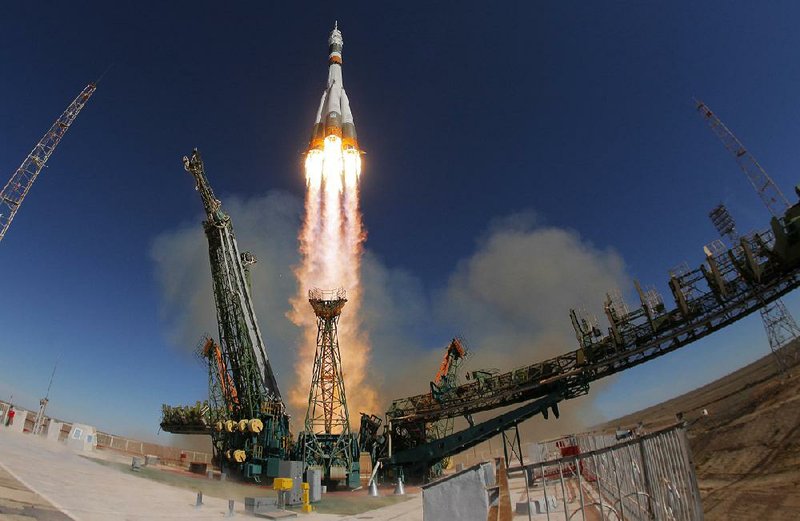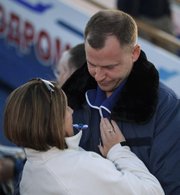MOSCOW -- A Russian Soyuz rocket malfunctioned two minutes after liftoff Thursday on a mission to the International Space Station, triggering an automatic abort command that forced the two-member crew -- an American and a Russian -- to make a harrowing emergency landing in their capsule, 200 miles from the launch site in the steppes of Kazakhstan.
U.S. astronaut Nick Hague and Russian cosmonaut Alexey Ovchinin had made it about halfway to space before suddenly going the other direction. They fell about 31 miles back to the surface, according to NASA. They were immediately found by rescue teams, removed from the capsule with no apparent injuries and flown back to the launch site for an emotional reunion with their families.
The failure of the Soyuz MS-10 rocket immediately led to the grounding of the Soyuz fleet and will have cascading effects for U.S. and Russian space programs, along with their international partners. The Soyuz is the only way to get to and from the station.
Something went very wrong -- a failure of unknown origin during the firing of the Soyuz MS-10 rocket's second booster -- but the escape system worked perfectly.
"It wasn't quite the day that we planned, but it is great to have Nick and Alexey at least back on the ground," said Kenny Todd, who directs space station operations for NASA. "This is a very difficult business that we're in. And it can absolutely humble you."
New NASA Administrator Jim Bridenstine, who watched the launch at the Russian-leased Baikonur cosmodrome with his Russian counterpart, said Hague and Ovchinin were in good condition.
"It was a tough day, no doubt, but at the end of the day, the training paid off for everybody," he said.
The launch looked good until a red light illuminated inside the capsule.
"Failure of the booster," a translator called out at mission control near Moscow, according to a transcript on Russian state TV.
The computers took over. The capsule automatically separated from the rocket. The crew felt a jolt and then quickly reported being weightless: They were in free fall back to Earth.
The crew members then initiated a "ballistic" trajectory that put Hague and Ovchinin under more than six times the force of gravity and put the capsule into a spin.
"We are getting ready for the G loads," Ovchinin reported to mission control. "G load is 6.7."
They were briefly out of contact. NASA's deputy chief astronaut, Reid Wiseman, said his heart was pounding as he wondered where the capsule would come down. At that point only gravity was in control, and rescue teams in helicopters raced to where they thought the capsule would land.
Parachutes deployed automatically. The gray-colored capsule tumbled onto grassy flatlands. As night fell in Central Asia, Hague and Ovchinin were being examined by medical officials and would soon likely return to Russia to the space training facility in Star City.
The launch was watched anxiously in Peabody, Kan., Hague's hometown.
NASA coordinated a private event at Peabody's Coneburg Inn exclusively for Hague's extended family, sending astronaut Victor Glover to be a personal envoy to the family there.
Before launch, Glover made a presentation about the mission, boasting about the reliability of the Russian-made Soyuz rocket the two were to launch in.
"The most important person in NASA right now is Nick Hague," he told the family.
The atmosphere in the bar was jovial -- essentially a reunion for the family, who had driven and flown in from across the country to watch their relative launch into space.
Soon after the rocket malfunctioned, Glover received word that the astronauts were making a ballistic descent, but that search-and-rescue crews were in contact with the astronauts.
A nervous applause followed.
About an hour and a half after the astronauts had landed, the family got word that Hague and Ovchinin were in good condition.
Hague would have been the fourth Kansan to go into outer space -- the others being Steve Hawley, Joe Engle and Ronald Evans.
Right now the space station has a crew of three -- an American, a German and a Russian. They may find their mission extended, but at some point they will need to return to Earth. Thursday's accident led NASA officials to acknowledge that they and their partners might need to bring everyone home and hope that the station can function safely with no one onboard, relying solely on commands from the ground.
On the orbiting space station, the three crew members were kept informed of the events on Earth.
"The boys have landed," mission control told the astronauts, who arrived at the space station in June and were scheduled to return Dec. 13.
Russia's Interfax news agency, citing sources in Russia's space program, said the space station crew will likely have to wait until early next year before another mission can be planned to deliver supplies and take them home.
Information for this article was contributed by Anton Troianovski of The Washington Post; by Dmitry Lovetsky, Vladimir Isachenkov, Jim Heintz and Marcia Dunn of The Associated Press; and by Matt Riedl of The Wichita Eagle.
A Section on 10/12/2018


